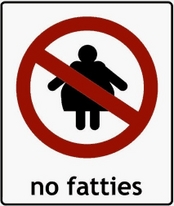Are You Considering Weight Loss Surgery? Be Prepared for Discrimination Against Obesity to Continue!

Without a doubt, obesity is stigmatized. The unfair bias that you face may be a major factor in your decision to consider or get weight loss surgery. Unfortunately, you will probably find that the obesity discrimination continues even as you try to use weight loss surgery to get healthy. Obese patients are blamed for their conditions, healthcare providers are not always sympathetic, and coverage for weight loss surgery is not guaranteed.
Why Do Obese Patients Get So Much Blame?
People are increasingly sympathetic to diseases that used to be stigmatized. Examples include cancer, many mental health conditions, and sexually transmitted diseases such as HIV/AIDS and syphilis. Now, treatment for these and other conditions, such as diabetes, is widely accepted as normal and an entitlement. Each of these conditions is largely the result of lifestyle choices, such as diet, use of tobacco and/or alcohol, sexual behavior, and physical activity levels. More than 80% of cancers are likely the result of lifestyle choices.
Ironically, though, many people in our society remain unsympathetic to obese people. They are quick to blame obese people for having no self-control, for refusing to follow a diet, and for not wanting to be healthy. You know, though, that those accusations are far from the truth. If you are considering weight loss surgery, you are confident that you have the self-control for the weight loss surgery diet, that you have tried to follow numerous diets but none have worked for you, and that you desperately want to be healthy!
You Did Not Ask to Be Obese: Some Factors are Outside of Your Control
More than one-third of American adults are obese, and another third are overweight. That in itself should remind you – and the people who judge you harshly – that fighting obesity is hard! The food environment includes fast food, vending machines, restaurants, food-focused social gatherings, and inexpensive snack foods.
There are also biological and family factors that you cannot control. Skinny people have no idea that you may be feeling extreme hunger all day, every day, or that your metabolism may be slower. Your family might have raised to choose high-calorie, high-fat foods, or even driven you into unhealthy emotional eating.
Research shows that some obese patients’ brains even respond differently to food compared to lower-weight individuals. Obese individuals, for example, tend to get less pleasure out of food, meaning they need to eat more to get satisfied. Furthermore, high-calorie foods like sugar can be addicting, leading to the same brain responses as cocaine does. But nobody blames cocaine addicts for their situations! Instead, they encourage counseling and intensive program to help them overcome their addictions, not punish them.
Discrimination in Obesity Treatment: A Look at Weight Loss Surgery Versus Dialysis
Just as unfair is the fact that the healthcare system continues the discrimination against obesity. Compare weight loss surgery as an obesity treatment with dialysis as a treatment for kidney failure (end-stage renal failure).
Far from being blamed for their conditions, kidney failure patients who need dialysis are provided the respect that all people deserve and the medical care that they need. Dialysis patients of all ages in the United States are able to apply for Medicare, the government’s health insurance program normally reserved for older adults. Dialysis treatments can cost about $40,000 per year, not including This is not to mention human factors such as reduced quality of life (the vast majority of dialysis patients are too sick to work) and early death (the life expectancy of dialysis patients is about 5 years). In comparison, a typical weight loss surgery procedure in the United States can cost $20,000 to $40,000, although it can be less, and successful patients are healthier and have more energy than before surgery.
The irony increases. The fact is that kidney failure usually results as a complication of type 2 diabetes or high blood pressure (hypertension). Both of these conditions are often caused by obesity; losing weight after weight loss surgery can prevent, eliminate, or reduce these conditions. In addition, it takes years for kidney failure to develop once you have high blood pressure or diabetes – years during which patients are likely to be on costly medications and inconvenient treatments.
Targeting obesity through weight loss surgery could prevent cases of diabetes and high blood pressure, reduce their effects in people who already have them, and prevent kidney failure, the need for dialysis, and early death.
Searching for Fairness in the Medical Treatment of Obesity
Your first barrier in your path to weight loss surgery may be your primary care physican (PCP). Some PCPs do not know much about weight loss surgery, or may be against it because they think obesity is your fault. Some PCPs take a narrow view of obesity, and feel that the only way to lose weight is for patients to “decide they want it badly enough” and “just eat less.” You already know that doesn’t work, so don’t let your PCP discourage you from learning more weight loss surgery if you think it might be the solution to your obesity struggles.
Insurance coverage has improved for obesity treatments, especially for weight loss surgery. Medicare and many private healthcare coverage plans cover weight loss surgery if you meet their predetermined weight and/or health criteria. Some private insurance companies, though, take a short-term view because they want to make profits within 3 years. Since most weight loss surgeries do not pay for themselves within 3 years, some private insurers do not cover weight loss surgery despite the likelihood that they would pay for themselves within 5 or 10 years, and in addition improve your health and quality of life.
Chance of Reduced Discrimination in the Future?
The majority of Americans believe that health insurance should cover weight loss surgery, in addition to other obesity treatments such as dietetic and mental health counseling. The Affordable Care Act (“Obamacare”), though, is not the ultimate solution. In nearly half of states, obesity treatments are not required to be covered by plans sold on the health exchanges. This determination is based on the available competitive services in the region. Since the most obese states are the ones least likely to have competitive anti-obesity care, these states are also least likely to have obesity treatments covered under the Affordable Care Act.
Overcome the Discrimination
Discrimination is an unfair fact of life as an obese individual, and it unfortunately does not end when you decide to get healthy using weight loss surgery as a tool. These are some of the ways that you can keep going strong and overcome the barriers you encounter as you work to get healthy.
- You have the right to a second opinion if your primary care physician recommends against weight loss surgery but you would like to find out more.
- Do not take “no” for an answer from your insurance company if you know you are entitled to reimbursement for surgery.
- Do not listen to negative family members or friends who do not understand your obesity or interest in weight loss surgery. It is your life and health.
- Educate others as much as you can to try to reduce the discrimination. Chances are that they are only being discriminatory out of ignorance, not out of true mean-spiritedness.
Like it or not, some discrimination remains as you go through your weight loss journey. You cannot prevent it, but you can change how you react to it. Expect it and respond as positively as you can, keeping your own health and goals in mind. Over time, as you and others prove that weight loss surgery can be a worthwhile treatment for obesity, discrimination by insurance companies, healthcare providers, and the public will decrease.
Impressive article Alex.
Yes !
Thanks for the article. I have family members who will not admit that I am better than when I was morbidly obese. Not sure if they are jealous or what!! Sure hurts, but my counselor is helping me deal with it!!!
Great article and so informative!! It's true, I've had really bad responses to my choice to change but they don't hinder me but I will make sure to inform them instead of shun them.
Thanks
Great article. Thanks so much for starting this website, I'm finding it so helpful.
Hi I'm new to this site and just getting started on this journey I've been reading the posts and have found info I wouldn't have thought to ask and so much support it's really such a relief to know there's a place to go where people understand what goes on and to be able to ask questions so it's very much appreciated
Not having always been large in size, I now know what it feels like to be invisible. I even notice things like, not being called on in a class, even having raised my hand first; or not being heard in my family, or responded to, now that I'm obese. Perhaps it was always there, as the other sibling is a very successful male, but I sure notice it. I call my obesity my cloak of invisibility. It is sure an eye opener. And sad. I think it has been part of losing myself and just staying inside, both myself and my house. Being invisible to those around me has seemed to infect me and I've started to live that way and believe it myself.
Excellent piece, Alex. Thank you.











Terry Poperszky 2,784
Posted
Impressive article Alex.
Share this comment
Link to comment
Share on other sites